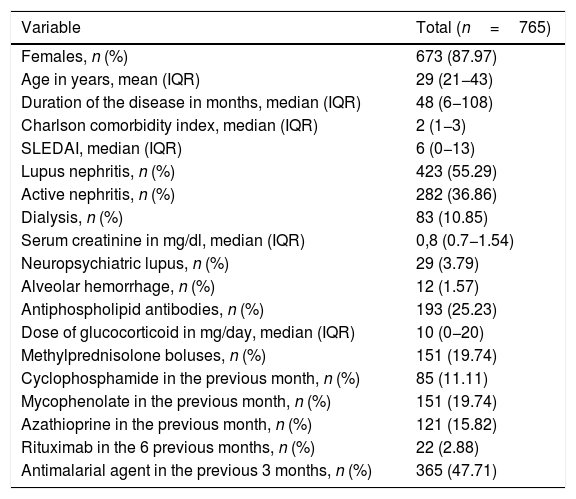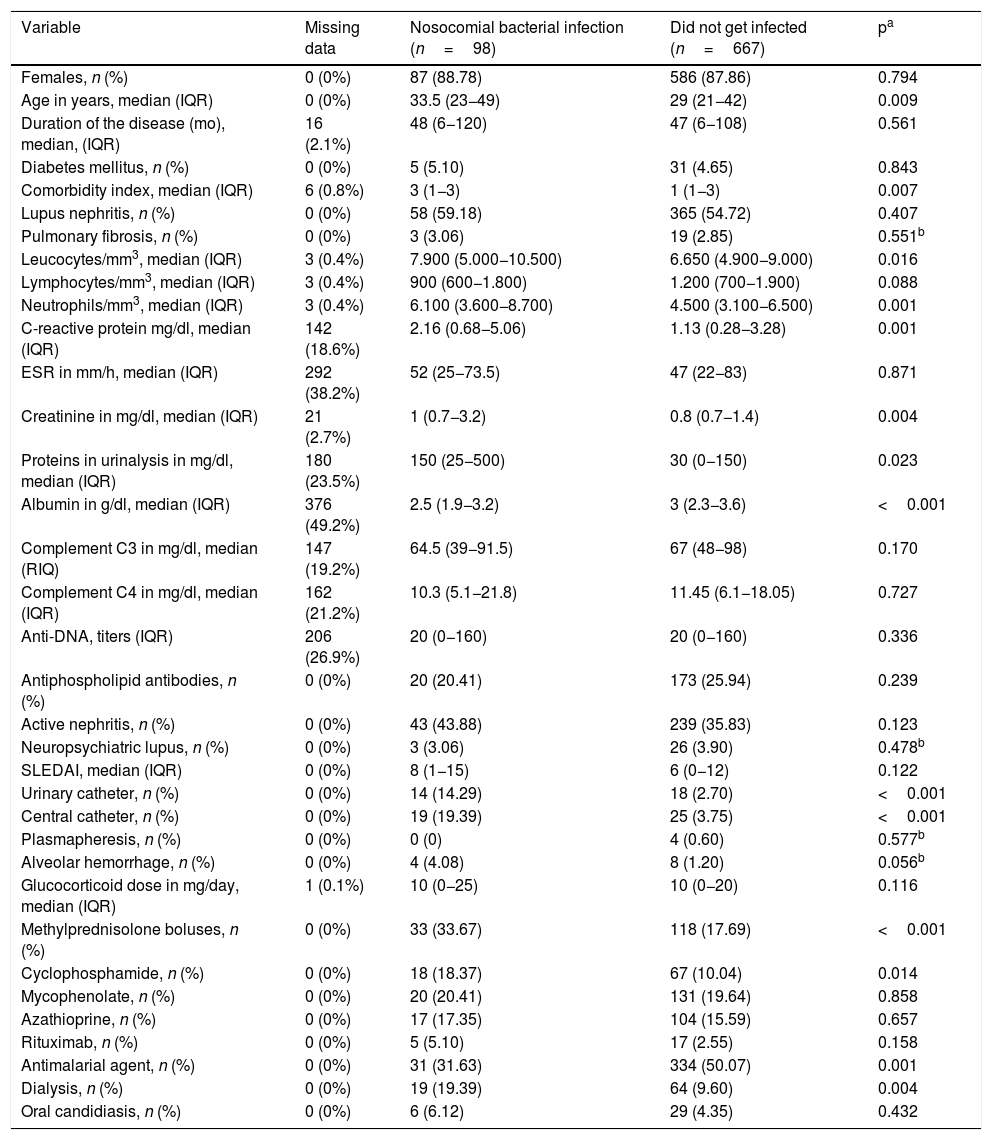Patients with systemic lupus erythematosus (SLE) have an increased risk of developing community-acquired infections, as well as those associated with health care. Bacterial infections are the most common and serious while these patients are in hospital.
ObjectiveTo develop, and internally validate, a clinical prediction model for the prognosis of the risk of hospital-acquired bacterial infection in SLE patients, using clinical and laboratory data obtained during the first hours of hospital admission.
MethodsAn analysis was performed on retrospective cohort of patients with SLE older than 16 years and admitted for reasons other than bacterial infection in two highly complex hospitals in Medellín between 2011 and 2016. The characteristics of the patients who developed a bacterial infection were compared between day 3 and day 15 of hospital admission with those who did not develop one. The significant variables in the bivariate analysis were used for the construction of the model using multivariate logistic regression.
ResultsA total of 765 episodes were included, of which 98 (12.8%) presented the outcome of interest. Thirty candidate predictors were considered. The variables incorporated in the final model were: age, neutrophil count, SLEDAI lupus activity score, use of a bladder catheter, use of a central venous catheter in the first 72h, glucocorticoid doses in the previous month, and use of an antimalarial drug in the 3 previous months. The discrimination capacity of the model was acceptable to good (AUC-ROC=0.74; 95% CI, 0.69–0.80). The Hosmer–Lemeshow goodness of fit test (p=.637) suggested adequate calibration.
ConclusionA clinical prediction model of prognostic risk of nosocomial bacterial infection in patients with SLE has been developed. This model is made up of simple clinical and laboratory variables available at the time of hospital admission. External validation and clinical impact studies are required before routine implementation.
Los pacientes con lupus eritematoso sistémico (LES) tienen un riesgo aumentado de padecer infecciones tanto adquiridas en la comunidad como asociadas con el cuidado de la salud. Las infecciones bacterianas son las más frecuentes y graves durante la hospitalización de estos pacientes.
ObjetivoDesarrollar y validar internamente un modelo de predicción clínica de pronóstico del riesgo de infección bacteriana adquirida en el hospital en pacientes con LES usando datos clínicos y de laboratorio obtenidos durante las primeras horas de hospitalización.
MétodosSe analizó una cohorte retrospectiva de pacientes con LES mayores de 16 años hospitalizados por motivos diferentes a infección bacteriana en dos hospitales de alta complejidad de xxx entre 2011 y 2016. Se compararon las características de los pacientes que desarrollaron el desenlace infección bacteriana entre el día 3 y el día 15 de hospitalización con aquellos que no lo presentaron. Las variables significativas en el análisis bivariado fueron consideradas para la construcción del modelo por medio de regresión logística multivariada.
ResultadosSe incluyeron 765 episodios, de los cuales 98 (12,8%) presentaron el desenlace de interés. Se consideraron 35 predictores candidatos. Las variables incorporadas en el modelo final fueron: edad, recuento de neutrófilos, puntaje de actividad lúpica SLEDAI, uso de sonda vesical, uso de catéter venoso central en las primeras 72 horas, dosis de glucocorticoides en el mes previo y el uso de antimalárico en los 3 meses previos. La capacidad de discriminación del modelo fue aceptable a buena (AUC-ROC=0,74; IC 95%: 0,69−0,80). La prueba de bondad de ajuste de Hosmer–Lemeshow (p=0,637) sugirió una adecuada calibración.
ConclusiónDesarrollamos un modelo de predicción clínica de pronóstico del riesgo de infección bacteriana nosocomial en pacientes con LES. El modelo desarrollado está compuesto por variables clínicas y de laboratorio simples disponibles al momento del ingreso al hospital. Se requieren estudios de validación externa y de impacto clínico antes de su implementación rutinaria.








